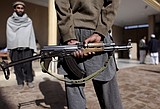Crises test U.S.-allied Pakistan
Chris Brummitt | Hagadone News Network | UPDATED 15 years, 6 months AGO
ISLAMABAD - Not for the first time, Pakistan appears to be teetering on the edge with a government unable to cope.
Floods are ravaging a country at war with al-Qaida and the Taliban. Riots, slayings and arson are gripping the largest city. Suggestions are flying that the intelligence agency is aiding Afghan insurgents.
The crises raise questions about a nation crucial to U.S. hopes of success in Afghanistan and to the global campaign against Islamist militancy.
Despite the recent headlines, few here see Pakistan in danger of collapse or being overrun by militants - a fear that had been expressed before the army fought back against insurgents advancing from their base in the Swat Valley early last year.
From its birth in 1947, Pakistan has been dogged by military coups, corrupt and inefficient leaders, natural disasters, assassinations and civil unrest. Through it all, Pakistan has not prospered - but it survives.
"There is plenty to be worried about, but also indications that when push comes to shove the state is able to respond," said Mosharraf Zaidi, an analyst and writer who has advised foreign governments on aid missions to Pakistan.
"The military has many weaknesses, but it has done a reasonable job in relief efforts. There have been gaps in the response. But this is a developing a country, right?"
The recent flooding came at a sensitive time for Pakistan, with Western doubts over its loyalty heightened by the leaking of U.S. military documents that strengthened suspicions the security establishment was supporting Afghan insurgents while receiving billions in Western aid.
With few easy choices, the United States has made it clear it intends to stick with Pakistan. Indeed, it has used the floods to demonstrate its commitment to the country, rushing emergency assistance and dispatching helicopters to ferry the goods.
The Pakistani government's response to the floods has been sharply criticized at home, especially since President Asif Ali Zardari departed for a European tour. With so many Pakistanis suffering, the trip has left the already weak and unpopular leader even more vulnerable politically.
The flooding was triggered by what meteorologists said were "once-in-a-century" rains. The worst affected area is the northwest, a stronghold for Islamist militants. Parts of the northwest have seen army offensives over the last two years.
Unless the people are helped quickly and the region is rebuilt, anger at the government could translate into support for the militants. At least one charity with suspected links to a militant outfit has established relief camps there.
The extremism threat was highlighted by a suicide bombing in the main northwestern town of Peshawar on Wednesday. The bomber killed the head of the Frontier Constabulary, a paramilitary force in the northwest at the forefront of the terror fight.
With authorities concentrating on flood relief, some officials have expressed concern that militants could regroup.
The city of Karachi has seen militant violence and is rumored to be a hiding place for top Taliban and al-Qaida fighters. It has also been plagued by regular bouts of political and ethnic bloodletting since the 1980s, though it has been calmer in recent years.
ARTICLES BY CHRIS BRUMMITT
No wreckage found near oil slicks
Search for missing Malaysia Airlines plane continues

Crises test U.S.-allied Pakistan
ISLAMABAD - Not for the first time, Pakistan appears to be teetering on the edge with a government unable to cope.

Militias pay big price in Pakistan
Tribal groups help stem Taliban, but at what cost?
MATANI, Pakistan - Tribal militias allied with the government helped block a Taliban advance in this corner of northwest Pakistan close to the Afghan border, but their success has come at a price: the empowerment of untrained, unaccountable private armies that could yet emerge as a threat of their own.

